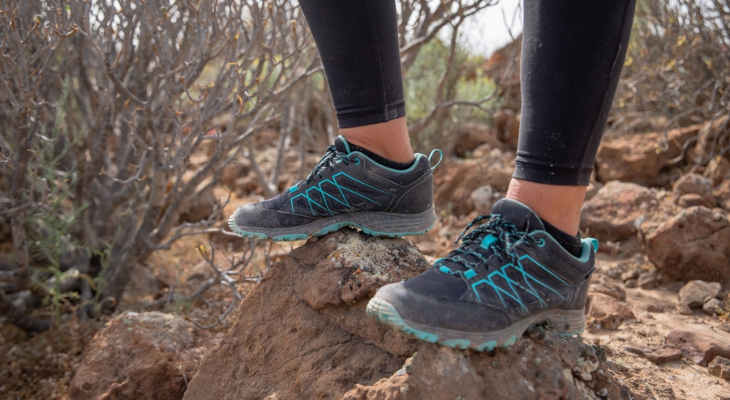
Feet Are a Crucial Link in Your Body's Kinetic Chain
Your feet play an essential role in the structure and stability of your body. If they're not strong, you're more likely to develop a variety of aches and pains throughout your body. In fact, feet are one of the most important links in the kinetic chain.
What Is the Kinetic Chain?
A train can derail if just one car starts to wobble on the tracks. Since each car is linked, any unusual movement in one car sets off a chain reaction that affects the other cars in the link.
The body works much the same way. Every body part is part of a linked system called the kinetic chain. The links in the chain work together to provide support and stability and allow easy movement. An issue with one link in the chain can lead to problems that affect other areas.
What Is the Role of the Feet in the Kinetic Chain?
Your feet serve several important roles, including:
- Supporting Your Weight. Strong arches distribute your weight evenly over the surface of your feet.
- Keeping Your Bones Properly Aligned. Your feet serve as the foundation for your body. Without a strong foundation, the bones in your legs, hips, and back may become misaligned.
- Absorbing Shock. Feet absorb shock when you walk, run, and move. If there's a problem with your feet, the other body parts in the chain must absorb more shock than they should, which can lead to pain and injuries.
A problem with your feet, such as flat feet or high arches, can alter the alignment of the bones in your legs, hips, and back. Excessive pronation, a common foot problem that occurs when your feet turn inward too much, may also be to blame for your aches and pain. Any foot issue may force the other links in the kinetic chain to rearrange themselves to compensate. Unfortunately, this may cause misalignments that affect your posture, balance, and gait.
If you don't correct the problem, you might develop ankle, knee, hip, or back pain. A kinetic chain issue can also cause:
- Sore Muscles
- Calf Pain
- Falls and Injuries Due to Balance and Gait Problems
- Leg Weakness
- Stress Fractures
- Plantar Fasciitis
- Achille Tendinitis
One side of your body may become unusually weak or strong as it struggles to realign itself. This can cause imbalances that pull on muscles and tissues and force the vertebrae in your spine out of alignment.
What You Can Do to Keep Your Feet Strong and Healthy
Protecting the kinetic chain starts with good foot care. Keep your feet in top shape by:
- Choosing Shoes Carefully. Look for comfortable shoes that offer arch support and provide plenty of room to wiggle your toes. Shoes like flip-flops are fine for occasional wear but shouldn't be your primary footwear choice. The American Podiatric Medical Association notes that flip-flops don't offer enough arch support or shock absorption.
- Visiting Your Chiropractor. If nothing you do eases your back, hip, or leg pain, a problem with your feet may be to blame. Your chiropractor will perform a thorough examination to determine if a foot issue is the cause of your pain or a contributing factor. He or she can also provide a variety of treatments that will relieve your painful symptoms, such as spinal manipulation to realign misaligned vertebrae, massage to relax tight tissues, or ultrasound to warm and soothe deep tissues.
- Using Orthotics. During your visit to the chiropractic office, your chiropractor may recommend orthotics. These custom prescription shoe inserts keep your foot properly aligned when you wear shoes, add extra cushioning, and provide arch support. Orthotics improve your comfort, help you avoid injuries, and keep your kinetic chain balanced. The inserts can be particularly helpful if you're a runner. In a study published in the World Journal of Orthopaedics, researchers reported that people who wore orthotics when running were more comfortable, ran 0.3 mph faster, and were 2.22 times less likely to experience injuries.
Wondering if your pain could be caused by a kinetic chain issue? Contact our office to schedule an appointment with the chiropractor.
Sources:
American Podiatric Medical Association: Avoid a Flip-Flop Fiasco
https://www.apma.org/flipflopFAQ
World Journal of Orthopaedics: Does Orthotics Use Improve Comfort, Speed, and Injury Rate During Running? a Randomised Control Trial, 5/18/2023
https://www.ncbi.nlm.nih.gov/pmc/articles/PMC10251264/
National Institute of Health: Focus on Your Feet, 3/2023
https://newsinhealth.nih.gov/2023/03/focus-your-feet
Harvard Health Publishing: Feet: How Your Feet Work – and Three Steps for Keeping Them Healthy, 8/1/2009
Chiropractic Economics: As a Chiropractor, You Need to Be Supporting the Kinetic Chain, 11/2/2018
https://www.chiroeco.com/kinetic-chain-orthotics/
Ace Fitness: What Is the Kinetic Chain, 1/8/2019
